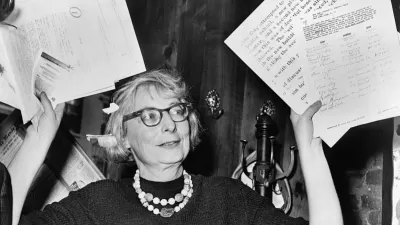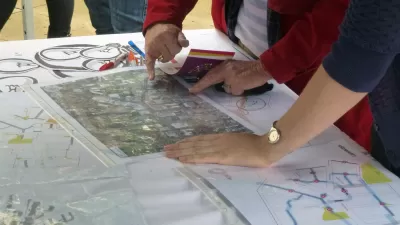Architecture Critic Mark Lamster attended the recent Congress for The New Urbanism annual conference, this year held in Dallas. One panel in particular, "How to Rebuild Architecture," proved informative.
Mark Lamster's critique of CNU 23 took the "How to Rebuild Architecture" panel from the event as its inspiration. The panel was inspired by a recent op-ed in the New York Times, authored by Steven Bingler and Martin Pedersen, and shared here on Planetizen. Lamster takes the article and the panel as fertile ground for both the state of architecture as well as the professional and political agendas of the Congress for the New Urbanism.
After distinguishing between "new urbanism" as a general concept about progressive urbanism and "New Urbanism" as an organized movement with a governing body, Lamster goes on to detail some of the highlights and controversies of the history of New Urbanism so far.
That primer leads up to Lamster's larger point about the state of contemporary architecture, which is informed by CNU's opinions about modernism and the business realities of the contemporary practice of architecture:
"And here were come to the crux of the problem with the CNU’s rebuilding architecture session. Its assumption is that the problem with the built environment, the reason that there is so much junk building out there, is because architects have lost their design principles. This gives tremendous agency to architects; the problem can be solved if only they can find the right language, the 'radical middle.'"
Lamster, however, would assign the blame for so many "boorish and boring works" to a larger cohort, including, the implication goes, planners:
"A developer looking to make a quick dollar by building and flipping property has little interest in building for the long term. In any number of ways—our building codes, our housing policies, our preservation statutes—we systemically encourage bad building."
FULL STORY: Why is so much architecture junk?

Study: Maui’s Plan to Convert Vacation Rentals to Long-Term Housing Could Cause Nearly $1 Billion Economic Loss
The plan would reduce visitor accommodation by 25,% resulting in 1,900 jobs lost.

North Texas Transit Leaders Tout Benefits of TOD for Growing Region
At a summit focused on transit-oriented development, policymakers discussed how North Texas’ expanded light rail system can serve as a tool for economic growth.

Using Old Oil and Gas Wells for Green Energy Storage
Penn State researchers have found that repurposing abandoned oil and gas wells for geothermal-assisted compressed-air energy storage can boost efficiency, reduce environmental risks, and support clean energy and job transitions.

Private Donations Propel Early Restoration of Palisades Playground
Los Angeles has secured over $1.3 million in private funding to restore the Pacific Palisades playground months ahead of schedule, creating a modern, accessible space that supports community healing after recent wildfires.

From Blight to Benefit: Early Results From California’s Equitable Cleanup Program
The Equitable Community Revitalization Grant (ECRG) program is reshaping brownfield redevelopment by prioritizing projects in low-income and environmental justice communities, emphasizing equity, transparency, and community benefits.

Planting Relief: Tackling Las Vegas Heat One Tree at a Time
Nevada Plants, a Las Vegas-based nonprofit, is combating the city’s extreme urban heat by giving away trees to residents in underserved neighborhoods, promoting shade, sustainability, and community health.
Urban Design for Planners 1: Software Tools
This six-course series explores essential urban design concepts using open source software and equips planners with the tools they need to participate fully in the urban design process.
Planning for Universal Design
Learn the tools for implementing Universal Design in planning regulations.
Ascent Environmental
Borough of Carlisle
Institute for Housing and Urban Development Studies (IHS)
City of Grandview
Harvard GSD Executive Education
Toledo-Lucas County Plan Commissions
Salt Lake City
NYU Wagner Graduate School of Public Service





























